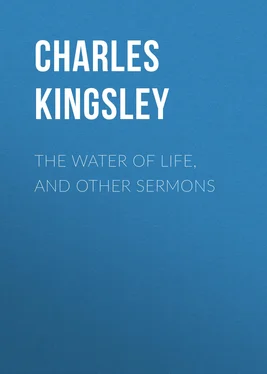Charles Kingsley - The Water of Life, and Other Sermons
Здесь есть возможность читать онлайн «Charles Kingsley - The Water of Life, and Other Sermons» — ознакомительный отрывок электронной книги совершенно бесплатно, а после прочтения отрывка купить полную версию. В некоторых случаях можно слушать аудио, скачать через торрент в формате fb2 и присутствует краткое содержание. Жанр: foreign_prose, foreign_religion, Философия, foreign_psychology, foreign_antique, на английском языке. Описание произведения, (предисловие) а так же отзывы посетителей доступны на портале библиотеки ЛибКат.
- Название:The Water of Life, and Other Sermons
- Автор:
- Жанр:
- Год:неизвестен
- ISBN:нет данных
- Рейтинг книги:4 / 5. Голосов: 1
-
Избранное:Добавить в избранное
- Отзывы:
-
Ваша оценка:
- 80
- 1
- 2
- 3
- 4
- 5
The Water of Life, and Other Sermons: краткое содержание, описание и аннотация
Предлагаем к чтению аннотацию, описание, краткое содержание или предисловие (зависит от того, что написал сам автор книги «The Water of Life, and Other Sermons»). Если вы не нашли необходимую информацию о книге — напишите в комментариях, мы постараемся отыскать её.
The Water of Life, and Other Sermons — читать онлайн ознакомительный отрывок
Ниже представлен текст книги, разбитый по страницам. Система сохранения места последней прочитанной страницы, позволяет с удобством читать онлайн бесплатно книгу «The Water of Life, and Other Sermons», без необходимости каждый раз заново искать на чём Вы остановились. Поставьте закладку, и сможете в любой момент перейти на страницу, на которой закончили чтение.
Интервал:
Закладка:
The deficiency in the funds of the hospital for the year 1862–3—caused, be it remembered, by no extravagance or sudden change, but simply by the necessity for succouring those who would otherwise have been destitute of succour—the deficiency, I say, on an expenditure of 15,000 l. amounts to more than 3,200 l. which has had to be met by selling out funded property, and so diminishing the capital of the institution. Ought this to be? I ask. Ought this to be, while more wealth is collected within half a mile of that hospital than in any spot of like extent in the globe?
My friends, this is the time of Lent; the time whereof it is written,—‘Is not this the fast which I have chosen, to deal thy bread to the hungry, and bring the poor that is cast out to thine house? when thou seest the naked that thou cover him, and that thou hide not thyself from thine own flesh? If thou let thy soul go forth to the hungry, and satisfy the afflicted soul, then shall thy light rise in obscurity, and thy darkness be as the noonday. And the Lord shall guide thee continually, and satisfy thy soul, and make fat thy bones, and thou shalt be like a watered garden, and as a spring that doth not fail.’
Let us obey that command literally, and see whether the promise is not literally fulfilled to us in return.
SERMON III
THE VICTORY OF LIFE
The grave cannot praise thee, death cannot celebrate thee: they that go down into the pit cannot hope for thy truth. The living, the living, he shall praise thee.
I may seem to have taken a strange text on which to speak,—a mournful, a seemingly hopeless text. Why I have chosen it, I trust that you will see presently; certainly not that I may make you hopeless about death. Meanwhile, let us consider it; for it is in the Bible, and, like all words in the Bible, was written for our instruction.
Now it is plain, I think, that the man who said these words—good king Hezekiah—knew nothing of what we call heaven; of a blessed life with God after death. He looks on death as his end. If he dies, he says, he will not see the Lord in the land of the living, any more than he will see man with the inhabitants of the world. God’s mercies, he thinks, will end with his death. God can only show His mercy and truth by saving him from death. For the grave cannot praise God, death cannot celebrate Him; those who go down into the pit cannot hope for His truth. The living, the living, shall praise God; as Hezekiah praises Him that day, because God has cured him of his sickness, and added fifteen years to his life.
No language can be plainer than this. A man who had believed that he would go to heaven when he died could not have used it.
In many of the Psalms, likewise, you will find words of exactly the same kind, which show that the men who wrote them had no clear conception, if any conception at all, of a life after death.
Solomon’s words about death are utterly awful from their sadness. With him, ‘that which befalleth the sons of men befalleth beasts; as one dieth, so dieth the other. Yea, they have all one breath, so that a man hath no pre-eminence over a beast, and all is vanity. All go to one place, all are of the dust, and all turn to dust again. Who knoweth the spirit of man that goeth upward, and the spirit of the beast that goeth downward to the earth?’
He knows nothing about it. All he knows is, that the spirit shall return to God who gave it,—and that a man will surely find, in this life, a recompence for all his deeds, whether good or evil.
‘Remember therefore thy Creator in the days of thy youth, while the evil days come not, nor the years draw nigh, when thou shalt say, I have no pleasure in them. Fear God, and keep His commandments; for this is the whole duty of man. For God shall bring every work into judgment, with every secret thing, whether it be good, or whether it be evil.’
This is the doctrine of the Old Testament; that God judges and rewards and punishes men in this life: but as for death, it is a great black cloud into which all men must enter, and see and be seen no more. Only twice or thrice, perhaps, a gleam of light from beyond breaks through the dark. David, the noblest and wisest of all the Jews, can say once that God will not leave his soul in hell, neither suffer His holy one to see corruption; Job says that, though after his skin worms destroy his body, yet in his flesh he shall see God; and Isaiah, again, when he sees his countrymen slaughtered, and his nation all but destroyed, can say, ‘Thy dead men shall live, together with my dead body shall they arise. Awake and sing, ye that dwell in dust: for thy dew is as the dew of the morning, which brings the parched herbs to life and freshness again.’—Great and glorious sayings, all of them: but we cannot tell how far either David, or Job, or Isaiah, were thinking of a life after death. We can think of a life after death when we use them; for we know how they have been fulfilled in Jesus Christ our Lord; and we can see in them more than the Jews of old could do; for, like all inspired words, they mean more than the men who wrote them thought of; but we have no right to impute our Christianity to them.
The only undoubted picture, perhaps, of the next life to be found in the Old Testament, is that grand one in Isaiah xiv., where he paints to us the tyrant king of Babylon going down into hell:—
‘Hell from beneath is moved for thee, to meet thee at thy coming; it stirreth up the dead for thee, even all the chief ones of the earth; it hath raised up from their thrones all the kings of the nations. All they shall speak and say unto thee, Art thou also become weak as we? art thou become like unto us? Thy pomp is brought down to the grave, and the noise of thy viols: the worm is spread under thee, and the worms cover thee. How art thou fallen from heaven, O Lucifer, son of the morning! how art thou cut down to the ground, which didst weaken the nations!’—Awful and grand enough: but quite different, you will observe, from the notions of hell which are common now-a-days; and much more like those which we read in the old Greek poets, and especially, in the Necyomanteia of the Odyssey.
When it was that the Jews gained any fuller notions about the next life, it is very difficult to say. Certainly not before they were carried away captive to Babylon. After that they began to mix much with the great nations of the East: with Greeks, Persians, and Indians; and from them, most probably, they learned to believe in a heaven after death to which good men would go, and a fiery hell to which bad men would go. At least, the heathen nations round them, and our forefathers likewise, believed in some sort of heaven and hell, hundreds of years before the coming of our blessed Lord.
The Jews had learned, also—at least the Pharisees—to believe in the resurrection of the dead. Martha speaks of it; and St. Paul, when he tells the Pharisees that, having been brought up a Pharisee, he was on their side against the Sadducees.—‘I am a Pharisee,’ he says, ‘the son of a Pharisee; for the hope of the resurrection of the dead I am called in question.’
But if it be so,—if St. Paul and the Apostles believed in heaven and hell, and the resurrection of the dead, before they became Christians, what more did they learn about the next life, when they became Christians? Something they did learn, most certainly—and that most important. St. Paul speaks of what our Lord and our Lord’s resurrection had taught him, as something quite infinitely grander, and more blessed, than what he had known before. He talks of our Lord as having abolished death, and brought life and immortality to light; of His having conquered death, and of His destroying death at last. He speaks at moments as if he did not expect to die at all; and when he does speak of the death of the Christian, it is merely as a falling asleep. When he speaks of his own death, it is merely as a change of place. He longs to depart, and to be with Christ. Death had looked terrible to him once, when he was a Jew. Death had had a sting, and the grave a victory, which seemed ready to conquer him: but now he cries, ‘O Death, where is thy sting? O Grave, where is thy victory?’ and then he declares that the terrors of death and the grave are taken away, not by anything which he knew when he was a Pharisee, but through our Lord Jesus Christ.
Читать дальшеИнтервал:
Закладка:
Похожие книги на «The Water of Life, and Other Sermons»
Представляем Вашему вниманию похожие книги на «The Water of Life, and Other Sermons» списком для выбора. Мы отобрали схожую по названию и смыслу литературу в надежде предоставить читателям больше вариантов отыскать новые, интересные, ещё непрочитанные произведения.
Обсуждение, отзывы о книге «The Water of Life, and Other Sermons» и просто собственные мнения читателей. Оставьте ваши комментарии, напишите, что Вы думаете о произведении, его смысле или главных героях. Укажите что конкретно понравилось, а что нет, и почему Вы так считаете.












